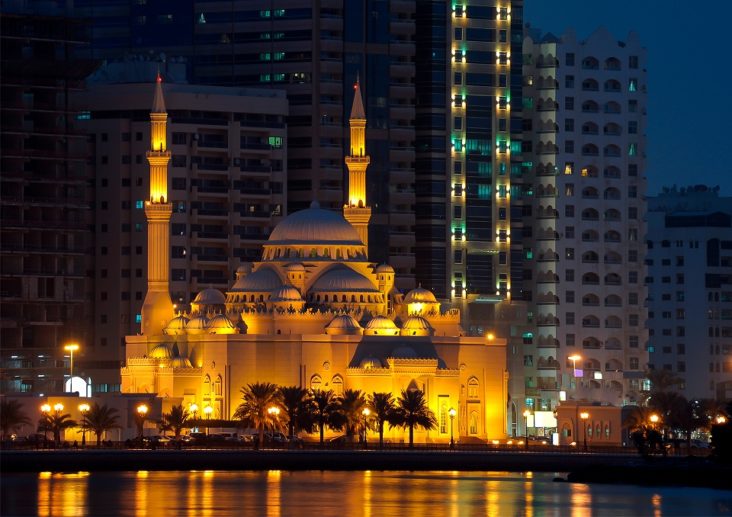Sharjah’s Mosques Record 5.2% Year-On-Year Growth In 2017

The Sharjah Department of Statistics and Community Development (DSCD) has reported that Sharjah’s mosques have grown at a rate of 5.2 percent in 2017, taking the total number from 1,398 in 2016 to 1,471 in 2017.
Geographic Distribution
The Department said that the number of mosques in Sharjah City, including Al Hamriyah and Abu Musa Island, increased from 914 in 2016 (of which 375 have been built by public entities, and 539 were established by the private sector) to 958 in 2017, with the public–private ratio of contribution being 387 to 571, respectively, with a year-on-year growth of 4.8 percent.
In Sharjah’s central region, the total number of mosques by the end of 2017 was counted as 290, of which 164 were built by public institutions and the remaining 126 by private entities, compared to 283 in 2016. The growth rate in the region is 2.5 percent with a public–private build distribution of 162:121, respectively.
According to DSCD, the Eastern region has witnessed the highest growth rate the last year, with an 10.9% increase in the number of mosques from 201 in 2016 to 223 in 2017.
Capacity
DSCD also reported that according to the Directorate of Islamic Affairs in Sharjah, the number of mosques with a capacity of less than 500 worshipers was 1,185 in 2016, and grew to 1,249 by the end of 2017, recording a.5.4 growth percentage. Mosques with 500-1,000 worshippers’ capacity have grown by 3.8 percent from 2016–17, increasing from 130 to 135 in one year.
The Department also said that number of mosques that accommodate between 1,000 and 5,000 worshipers has gone up from 79 to 83 in 2017, indicating a 5 percent growth in one year, while the number of mosques that can accommodate 5,000-plus worshipers remains 4, of which 3 are in Sharjah City and one in the Central Region.
The number of Eid Musallahs, the open spaces accessed by people during Eid, has been stable at 32 since 2015. Of these, 7 are in Sharjah City, 13 in the Central Region and 12 in the Eastern Region.
A vision for development
HE Sheikh Mohammed bin Abdullah Al Thani, Head of Statistics and Community Development in Sharjah, said: “Sharjah is working to realise its vision for sustainable development, which focuses on the community’s happiness and well-being. The availability of mosques in various regions and cities plays a vital role in meeting the needs of worshipers and facilitating religious practices.”
He added: “The number of mosques is growing annually, especially in the emirate’s central region. This reflects our efforts to provide best possible public services to Sharjah residents. I would like to highlight the role of the private sector and individuals in building and sponsoring about 48 percent of the emirate’s mosques, which speaks volumes about their dedication to drive corporate social responsibility, and their keenness for charity and giving.”
Established in 2010 by Emiri Decree No. (11), the Directorate of Housing (DH) aims to secure adequate housing for Emirati households, and deliver quality innovative housing services that contribute to the stability and development of society through proposing public policies and the elaborating strategic plans for government housing in the emirate. It conducts studies to identify the needs of citizens for housing in coordination with the relevant authorities. It also develops a mechanism to allocate housing projects in coordination with all state and private housing entities to implement government housing projects in the Emirate of Sharjah.




